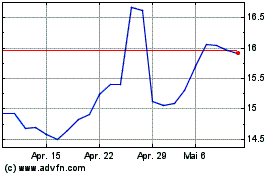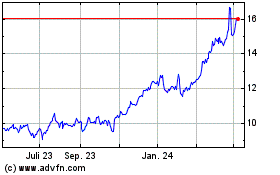By Sara Germano
This article is being republished as part of our daily
reproduction of WSJ.com articles that also appeared in the U.S.
print edition of The Wall Street Journal (July 13, 2019).
BERLIN -- German efficiency has taken a hit this year as many of
the country's most recognizable corporate names wrestle with a
slowing local economy, questionable business decisions and trouble
shifting to a digital world.
In the past week, Deutsche Bank AG abandoned its global
ambitions and initiated layoffs, and the chief executive of BMW AG
said he would step down. Profit warnings from BASF SE and Daimler
AG -- which issued its second in less than a month on Friday --
have rattled markets.
Those setbacks add to a worrisome mix that includes Bayer AG's
legal trouble with its acquisition of Monsanto, the maker of
weedkiller Roundup, and the challenge to German auto makers from a
depressed global car market and continued fallout from the
diesel-emissions scandal. Meanwhile, German blue chips -- from
software maker SAP SE to industrial giant Thyssenkrupp AG -- have
announced tens of thousands of job cuts combined this year.
Roughly one in three large public companies in Germany's DAX
index have reported profit warnings, job cuts or restructurings, or
are dealing with formidable legal disputes or investigations from
authorities. Firms based here are slipping from the ranks of the
world's most-valuable companies, leading consulting firm Ernst
& Young to conclude this month that "German companies are
losing their importance."
While specific challenges loom large for some companies, broad
trends are also working against them. Analysts cite the effects of
global trade disputes on Germany's export-oriented economy, the
increased pressure to digitize and a degree of complacency after
years of robust growth.
"There is a crisis at the moment. The German economy was so good
for such a long time, people thought we'd go on and go on and go
on," said Markus Schön, managing director of DVAM Asset Management
in Detmold, Germany.
The nation's economy grew just 0.7% in the 12 months through
March, far behind others in the eurozone, and Berlin earlier this
year slashed its growth forecast for 2019 gross domestic product to
0.5% from 1.8%. "German companies were not prepared for this
situation," Mr. Schön said.
German auto makers, in particular, have been blindsided. The
collapse in demand for diesel vehicles because of emissions curbs
and a global slowdown in car sales have hit them at a time when
they are spending heavily on electric and autonomous vehicle
development.
BMW as well as Mercedes-Benz maker Daimler have lowered their
financial guidance this year, while Volkswagen AG announced it
would cut 7,000 jobs. In turn, the difficulties of large car makers
have filtered down through a network of smaller suppliers and
service providers in the country.
Volkswagen was at the center of an emissions-cheating scandal
that surfaced in 2015, and it is still feeling the effects. In
March, the U.S. Securities and Exchange Commission sued the auto
maker and former Chief Executive Martin Winterkorn, alleging they
defrauded U.S. investors. And a month later, German prosecutors
indicted Mr. Winterkorn and four others, accusing them of
fraud.
Volkswagen called the SEC complaint "legally and factually
flawed" and said it would contest the charges. A lawyer for Mr.
Winterkorn declined to comment at the time of the charges and
didn't respond to a request for comment Friday.
Other German companies say their problems are closer to home.
Last month, days after Deutsche Lufthansa AG said aggressive
competition from European low-cost carriers hurt its profit, Chief
Executive Carsten Spohr acknowledged that the airline had made
missteps navigating the local short-haul market, including efforts
to capitalize on the 2017 bankruptcy of rival Air Berlin.
"Did we underestimate the complexity? We did," he said. In an
effort to reassure investors, Mr. Spohr affirmed the company's
commitment to being dependable and efficient. "In the end, we're
boring. We're German."
Another contributor to German corporate troubles is the
country's legally mandated board structure -- which flanks the
management board with a powerful supervisory board, half of whose
members represent workers. While such checks and balances have
helped maintain labor peace at large companies, they can also
inhibit quick decision-making and discourage risk-taking.
"It can be an advantage to have a strong CEO, who can react
quickly in times of crisis," said Christian Lawrence, a partner at
consulting firm Brunswick Group in Munich. "Whereas if you have a
German system, the CEO is one of many making decisions and there
must be consensus for things to be done."
Hubert Barth, chief executive of Ernst & Young Germany, said
some German blue chips aren't keeping pace with the transformation
of the economy toward "more digitized business models."
German companies and the government espouse a commitment to
digitization. This week, German economics minister Peter Altmaier
traveled to Silicon Valley to meet with executives from Alphabet
Inc.'s Google, Apple Inc. and others, part of a continuing effort
to raise Germany's profile in digital industry.
At the same time, there is a pervasive feeling, analysts and
executives say, that German companies can't keep up with the tech
giants from the U.S. and elsewhere. One impediment is the strong
limitation that German and European privacy laws put on companies'
ability to collect, store and monetize user data.
"Tell me one company in Germany which is playing a role in
platforms, the area of Facebook and Amazon," said Mr. Barth of
Ernst & Young. "There's no obvious German company that plays a
significant role."
In May, executives from Bertelsmann SE met to discuss ways the
media conglomerate can work with, and compete against, American
tech companies.
"We will never be able to gather the same amount of data as
Google, Facebook or Amazon," said one executive at the meeting.
"This is a fact, and we just have to deal with it. They are on
their own planet."
The performance of Germany's large companies isn't a perfect
measure of the health of the national economy. While the country is
home to many global brands, the backbone of its industry is the
vast number of small- and midsize private businesses known as the
Mittelstand.
Those traditionally family-owned private firms haven't
encountered the same challenges as large public companies, Mr.
Lawrence said, in part because their management system is less
complex and they aren't subject to the restrictions of the public
market.
But this economic structure has other negative consequences.
According to a report from the International Monetary Fund this
week, about 60% of corporate assets and profits in Germany are
generated by closely held firms, contributing to rising wealth
inequality in Germany, the biggest divide in Europe behind the
Netherlands and Austria.
"The concentration of privately held and publicly listed firm
ownership in the hands of industrial dynasties and institutional
investors is especially prevalent in Germany," the IMF report
said.
Write to Sara Germano at sara.germano@wsj.com
(END) Dow Jones Newswires
July 13, 2019 02:47 ET (06:47 GMT)
Copyright (c) 2019 Dow Jones & Company, Inc.
Deutsche Bank (TG:DBK)
Historical Stock Chart
Von Mär 2024 bis Apr 2024

Deutsche Bank (TG:DBK)
Historical Stock Chart
Von Apr 2023 bis Apr 2024
